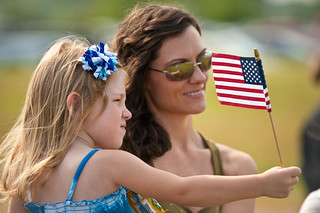Staff report
[caption id="attachment_22979" align="aligncenter" width="571"]

The U.S. Army Band from Camp Knox leads the parade in Bardstown, Ky. on July 4, 1923. (Photo courtesy Kentucky Historical Society)
“Every citizen should be a soldier. This was the case with the Greeks and Romans, and must be that of every free state.”
-Thomas Jefferson
Seriouly, what exactly does the Fourth of July mean to you? A day off from work, picnics, patriotic concerts and fireworks? For many, it’s an opportunity to don red, white, and blue and to unfurl the American flag. For some Americans, the day is an opportunity for a mini vacation with family or friends. It’s a brief respite from the long, wilting summer heat or the doldrums of work. It’s an opportunity to harken back to the idealized view of American life—post World War II patriotic suburbanites, indulging in neighborly fun.

Between the lemonade, barbeques, and summer games, what’s lost to many and remembered by few are the origins and significance of this special day—this most patriotic of patriotic holidays. The Fourth of July celebrates an important birth date—the birth of our nation’s willful defiance against British tyranny and the declaration of the independence of the thirteen colonies as separate, but united, states.
The brash colonists codified their independent stance in what is now the most important of all our nation’s historical documents—the Declaration of Independence—outlining a new ideal of government based on natural rights, a belief propagated by the great philosophers John Locke and Jean Jacques Rousseau. This revolutionary declaration espoused a government for the people, by the people. “We hold these truths to be self-evident, that all men are created equal, that they are endowed by their creator with certain unalienable rights, that among these are life, liberty and the pursuit of happiness.”
Instrumental in our nation’s fight for independence was the colonial militia, the predecessor of the colonial army and today’s National Guard. This geographically-based militia, composed of Citizen-Soldiers, was based on the laws and traditions of Great Britain, adapted to a new world.
These citizen-soldiers fought a valiant fight, ensuring the formation of an independent state, and laying the foundation for the National Guard’s role in future conflicts against nations and factions that threaten America and our allies’ freedom.

Since the terrorists’ attacks on America on September 11, 2001, more than 760,000 National Guard service members have deployed in support of overseas operations, more than 16,000 of them from the Kentucky Army and Air National Guard. Of those, nearly 600 have given their lives for our nation -- 18 of them Kentuckians. Today, more than 11,000 National Guard Citizen-Soldiers and Citizen-Airmen are far from home in harm’s way.
This Fourth of July, while we don our red, white, and blue, enjoy the company of our family and friends, listen to the patriotic music played by a National Guard band as it parades down main street, let’s not forget that our freedom is not free. That’s something our forefathers taught us in 1776, when they fought for and signed the Declaration of Independence. It’s a lesson we continue to learn today in far-flung places around the world.
As Franklin Delano Roosevelt once said, “In its truest sense, freedom cannot be bestowed; it must be achieved.” As we celebrate this Fourth of July, let’s be grateful for the lasting achievement of freedom secured by our National Guard men and women who remain always ready, always there and committed to fighting America’s wars, protecting our homeland, and building global and domestic partnerships to safeguard freedom around the world.